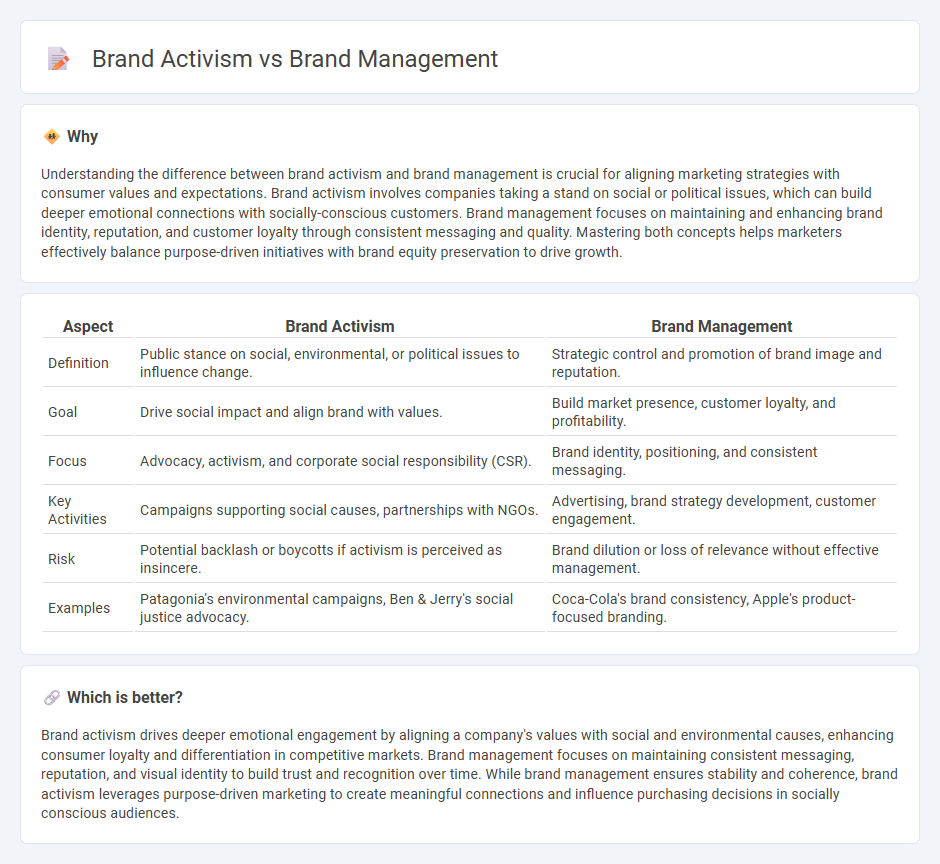
Brand activism involves companies taking a stand on social, environmental, or political issues to align with consumer values and drive meaningful change. Brand management focuses on building, maintaining, and enhancing a brand's identity, reputation, and market position to ensure long-term business success. Explore the key differences and strategies behind brand activism and brand management to optimize your marketing approach.
Why it is important
Understanding the difference between brand activism and brand management is crucial for aligning marketing strategies with consumer values and expectations. Brand activism involves companies taking a stand on social or political issues, which can build deeper emotional connections with socially-conscious customers. Brand management focuses on maintaining and enhancing brand identity, reputation, and customer loyalty through consistent messaging and quality. Mastering both concepts helps marketers effectively balance purpose-driven initiatives with brand equity preservation to drive growth.
Comparison Table
| Aspect | Brand Activism | Brand Management |
|---|---|---|
| Definition | Public stance on social, environmental, or political issues to influence change. | Strategic control and promotion of brand image and reputation. |
| Goal | Drive social impact and align brand with values. | Build market presence, customer loyalty, and profitability. |
| Focus | Advocacy, activism, and corporate social responsibility (CSR). | Brand identity, positioning, and consistent messaging. |
| Key Activities | Campaigns supporting social causes, partnerships with NGOs. | Advertising, brand strategy development, customer engagement. |
| Risk | Potential backlash or boycotts if activism is perceived as insincere. | Brand dilution or loss of relevance without effective management. |
| Examples | Patagonia's environmental campaigns, Ben & Jerry's social justice advocacy. | Coca-Cola's brand consistency, Apple's product-focused branding. |
Which is better?
Brand activism drives deeper emotional engagement by aligning a company's values with social and environmental causes, enhancing consumer loyalty and differentiation in competitive markets. Brand management focuses on maintaining consistent messaging, reputation, and visual identity to build trust and recognition over time. While brand management ensures stability and coherence, brand activism leverages purpose-driven marketing to create meaningful connections and influence purchasing decisions in socially conscious audiences.
Connection
Brand activism and brand management intersect by aligning corporate values with consumer expectations to enhance brand loyalty and reputation. Effective brand management integrates activism strategies that communicate authentic social and environmental commitments, driving engagement and differentiation in competitive markets. This synergy fosters trust and long-term stakeholder relationships crucial for sustained business growth and societal impact.
Key Terms
**Brand Management:**
Brand management involves strategically developing and maintaining a brand's identity, reputation, and value through consistent messaging, product quality, and customer experience. It emphasizes market positioning, consumer loyalty, and long-term profitability while managing brand equity across diverse channels. Discover how effective brand management can elevate your business and foster lasting connections with your target audience.
Brand Equity
Brand management emphasizes maintaining and enhancing brand equity through strategic marketing, consistent messaging, and customer loyalty initiatives. Brand activism, however, actively aligns a brand's values with social or political causes, aiming to build deeper emotional connections and increase brand equity through authentic engagement. Discover how integrating these approaches can elevate your brand's influence and equity.
Brand Positioning
Brand positioning centers on defining a unique market space and value proposition, shaping customer perceptions through consistent messaging and visual identity. Brand management ensures that this positioning remains relevant and competitive by monitoring market trends, customer feedback, and brand equity. Explore how integrating brand activism can enhance positioning by aligning values with consumer expectations.
Source and External Links
What Is Brand Management? - Acquia - Brand management is the practice of creating, maintaining, and optimizing how a company communicates its values, personality, and products, focusing on brand awareness, equity, consistency, and loyalty.
Brand management - Wikipedia - Brand management is the process of controlling how a brand is perceived, involving tangible elements like product design and intangible elements like customer relationships, to build brand equity and loyalty.
7 strategies for managing your brand - Sell on Amazon - Effective brand management includes defining your mission and values, developing branding guidelines, creating marketing plans, collaborating with influencers, monitoring performance, rewarding loyalty, and protecting the brand.
 dowidth.com
dowidth.com